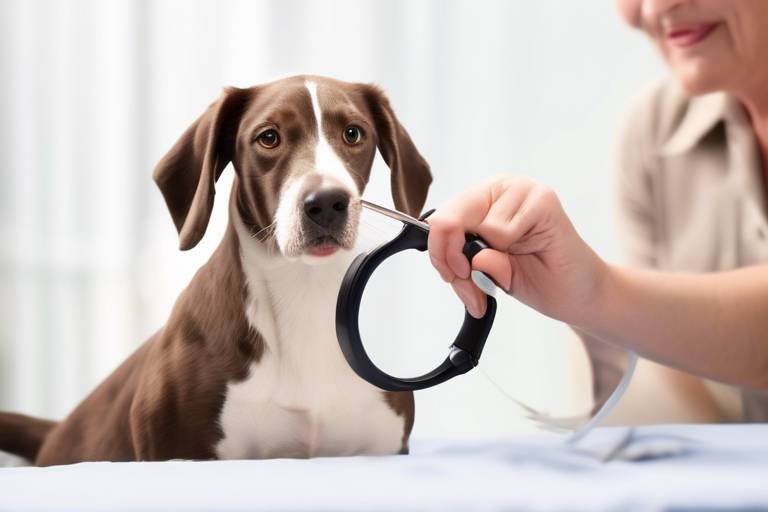The Role of Pet Insurance in Managing Emergencies
When it comes to our furry friends, we often find ourselves in a whirlwind of emotions, especially during emergencies. Imagine your beloved pet suddenly falling ill or getting injured; the panic sets in, and your heart races. In these critical moments, having pet insurance can be a game changer. It’s like having a safety net that catches you when you least expect to fall. This article explores the significance of pet insurance during emergencies, highlighting its benefits, types, and how it can alleviate financial stress for pet owners in critical situations.
So, what exactly is pet insurance? In simple terms, it's a policy that helps cover the cost of veterinary care for your pet. Think of it as a health insurance plan for your furry family member. The purpose of pet insurance is to provide financial support during unexpected health issues, ensuring that your pet receives the necessary care without breaking the bank. Policies typically cover a range of services, from routine check-ups to emergency surgeries, depending on the plan you choose. Understanding the basic concepts and terms associated with pet insurance policies can empower you to make informed decisions about your pet's health.
When it comes to pet insurance, one size does not fit all. There are various types of plans available, each catering to different needs. Here’s a quick overview of the primary types:
- Accident-Only Plans: These plans cover injuries resulting from accidents, but not illnesses.
- Comprehensive Plans: These plans cover a wide range of health issues, including both accidents and illnesses.
- Wellness Plans: These plans focus on preventive care, covering routine check-ups and vaccinations.
Understanding these options will help you choose the right coverage for your pet's unique needs.
Accident-only plans are designed to cover injuries resulting from unforeseen accidents. While they can be less expensive than comprehensive plans, it’s essential to weigh the benefits and limitations. For instance, if your pet is an adventurous spirit—think of a dog that loves to chase squirrels or a cat that climbs trees—this type of coverage could be beneficial. However, if your pet has a history of health issues, this plan may not provide the comprehensive coverage you need.
Understanding the cost implications of accident-only plans is crucial. These plans typically have lower premiums, but you’ll want to be aware of deductibles and co-pays. For example, while your monthly payment might be manageable, an unexpected trip to the vet could still leave you with a hefty bill. It’s important to crunch the numbers and determine what fits your budget while ensuring your pet's health is prioritized.
Not every pet will benefit equally from accident-only plans. Pets that lead a more sedentary lifestyle may not need this type of coverage as much as those who are more active. For example:
- Active Dogs: Breeds that love to run and play are more prone to accidents.
- Indoor Cats: They may be less likely to incur injuries, making comprehensive plans more suitable.
Choosing the right plan is all about understanding your pet's lifestyle and health risks.
On the other hand, comprehensive plans cover a broad spectrum of issues, including both accidents and illnesses, providing peace of mind for pet owners. Imagine the relief of knowing that if your pet develops a serious illness, you won’t have to make heart-wrenching decisions based on finances. This extensive coverage is particularly beneficial for older pets or those with pre-existing conditions, as it ensures that they receive the care they need without the burden of overwhelming costs.
Having pet insurance can be a lifesaver during emergencies. Here are some critical benefits:
Pet emergencies can hit you hard in the wallet. An unexpected surgery or treatment can cost thousands of dollars. With pet insurance, you can alleviate the financial stress associated with these situations. Instead of worrying about how to pay for your pet's care, you can focus on what truly matters: their recovery. Think of it as a financial cushion that allows you to act swiftly without the paralyzing fear of costs.
With pet insurance, you can prioritize your pet's health without worrying about the price tag. This means you can seek out top-notch veterinary services, specialists, or even emergency care without hesitation. It’s like having a VIP pass to the best care available for your furry friend. When the stakes are high, and every second counts, having insurance can make all the difference in ensuring your pet receives the best treatment possible.
1. Is pet insurance worth it?
Yes, especially if your pet is prone to accidents or illnesses. It can save you from significant financial burdens in emergencies.
2. What does pet insurance typically cover?
Coverage varies by plan, but it generally includes accidents, illnesses, surgeries, and sometimes routine care.
3. Can I get insurance for an older pet?
Yes, many companies offer plans for older pets, though pre-existing conditions may not be covered.
4. How do I choose the right plan?
Consider your pet's health, lifestyle, and your budget. Compare different policies to find the best fit.

Understanding Pet Insurance
When it comes to our furry friends, we want nothing but the best for them, right? But let’s face it, veterinary bills can sometimes feel like they’re made of gold! That’s where pet insurance steps in, acting as a safety net for pet owners during those unexpected health crises. But what exactly is pet insurance? In simple terms, it’s a policy that helps cover the costs of veterinary care, ensuring that you can provide your pet with the necessary treatment without breaking the bank.
Pet insurance typically works on a reimbursement model. This means you pay for your pet’s medical expenses upfront, and then you file a claim with your insurance provider for reimbursement. While it sounds straightforward, understanding the ins and outs of these policies can be a bit tricky. Let’s break down some key concepts and terms associated with pet insurance:
- Premium: This is the amount you pay for your insurance policy, usually on a monthly basis. Think of it as your membership fee to ensure your pet’s health is covered.
- Deductible: This is the amount you need to pay out of pocket before your insurance kicks in. It’s like a threshold that must be met before the benefits start.
- Co-pay: After meeting your deductible, you may still need to pay a portion of the bill. This is your co-pay, which is a percentage of the costs that you’re responsible for.
- Exclusions: Every policy has certain limitations or exclusions. These are specific conditions or treatments that the insurance won’t cover, so it’s crucial to read the fine print.
Understanding these terms is essential for making informed decisions about your pet’s insurance policy. It’s not just about picking a plan; it’s about ensuring that you understand how it works so that you can maximize your benefits and minimize any surprises when you need to file a claim.
Moreover, pet insurance can vary significantly among providers. Some may offer comprehensive coverage, while others might focus on specific aspects like accidents or wellness care. It’s always wise to compare different plans and assess what works best for your pet's unique needs. After all, just like us, pets have their own personalities and health risks, which can influence the type of coverage that is most beneficial.
In summary, pet insurance is more than just a safety net; it’s a proactive approach to pet healthcare. By understanding the basic concepts and terminology, you can navigate the often overwhelming world of pet insurance with confidence and ensure that your beloved companion receives the best possible care when they need it the most.

Types of Pet Insurance Plans
When it comes to protecting our furry friends, understanding the different types of pet insurance plans is crucial. Just like humans, pets can face unexpected health issues, and having the right insurance can make all the difference. In this section, we’ll dive into the various plans available, helping you make an informed choice that suits your pet’s unique needs.
There are mainly three types of pet insurance plans: accident-only plans, comprehensive plans, and wellness plans. Each of these has its own perks and considerations, so let’s break them down.
Accident-only plans are designed to cover injuries resulting from accidents. Imagine your playful pup getting into a tussle at the dog park or your curious cat knocking something over and getting hurt. These plans can help cover the costs associated with those unexpected mishaps. However, it’s important to note that these plans do not cover illnesses. So, if your pet were to fall ill, you’d be left to foot the bill entirely out of pocket.
When considering an accident-only plan, it’s essential to evaluate the cost implications. Typically, these plans have lower premiums compared to comprehensive options, making them an attractive choice for budget-conscious pet owners. However, you should also be aware of the deductibles and how they might affect your overall expenses during a crisis. It’s a balancing act between affordability and coverage, and understanding these factors can help you make a more informed decision.
Accident-only plans may be ideal for pets that lead a relatively low-risk lifestyle. For instance, if you have an older dog who enjoys lounging at home rather than engaging in adventurous activities, this type of plan could suffice. On the flip side, if your pet is a high-energy breed or tends to get into trouble, you might want to consider more comprehensive coverage.
Comprehensive plans, on the other hand, offer a broader range of coverage. These plans typically cover both accidents and illnesses, giving you peace of mind when it comes to your pet's health. Think of it as a safety net that catches you when life throws you unexpected curveballs, like a sudden illness or a chronic condition that requires ongoing treatment.
With comprehensive coverage, you can often include additional options, such as coverage for hereditary conditions, which can be particularly beneficial for certain breeds prone to specific health issues. While these plans tend to come with higher premiums, the extensive coverage they provide can save you from significant financial strain in the long run.
In summary, understanding the different types of pet insurance plans is vital for every pet owner. Whether you lean towards an accident-only plan or opt for a comprehensive one, knowing the ins and outs of each option will empower you to choose the best coverage for your beloved pet.
Accident-Only Plans
Accident-only plans are a specific type of pet insurance designed to cover injuries resulting from accidents, such as fractures, lacerations, or even ingestion of foreign objects. These plans are particularly appealing to pet owners who want to ensure their furry friends receive immediate medical attention in case of unexpected mishaps. However, it’s crucial to understand that while these plans can provide significant financial relief during emergencies, they do not cover illnesses or routine care. This limitation can lead to some tough decisions down the road, especially if your pet faces a health crisis that is unrelated to an accident.
One of the main advantages of accident-only plans is their affordability. Typically, these plans come with lower premiums compared to comprehensive coverage, making them an attractive option for budget-conscious pet owners. However, it’s essential to weigh these savings against the potential costs of unexpected veterinary bills for illnesses that will not be covered. For instance, if your pet is prone to certain health issues, opting for an accident-only plan could leave you financially vulnerable when illness strikes.
When considering accident-only plans, it’s also important to evaluate your pet’s lifestyle and risk factors. For example, if your pet is an adventurous outdoor enthusiast who loves to explore the great outdoors, they may be at a higher risk for accidents. On the other hand, if your pet is more of a couch potato, the likelihood of accidents may be lower. Here’s a quick overview of who might benefit from accident-only plans:
| Type of Pet | Ideal Candidates for Accident-Only Plans |
|---|---|
| Active Dogs | Dogs that frequently engage in outdoor activities, such as hiking or running. |
| Curious Cats | Cats that explore outside, risking accidents from cars or other hazards. |
| Young Pets | Puppies and kittens who are naturally more prone to accidents. |
Ultimately, the decision to choose an accident-only plan should be based on a thorough assessment of your pet’s lifestyle, health history, and your own financial situation. While these plans can be a lifesaver in emergencies, it’s essential to consider whether they provide adequate coverage for your pet’s overall health needs. By understanding the benefits and limitations of accident-only plans, you can make a more informed decision that ensures your furry friend gets the care they deserve without breaking the bank.
Understanding the cost implications of accident-only plans is vital for pet owners. Typically, these plans have lower premiums, but it’s important to also consider deductibles and co-pays that may apply when filing a claim. Here’s a breakdown of the costs associated with accident-only plans:
| Cost Factor | Details |
|---|---|
| Monthly Premium | Generally lower than comprehensive plans, making it budget-friendly. |
| Deductibles | Amount you pay out-of-pocket before coverage kicks in; varies by plan. |
| Reimbursement Rate | Percentage of the vet bill that the insurance will cover post-deductible. |
By carefully analyzing these factors, pet owners can make informed financial decisions regarding their pets' health care needs. Remember, while saving money on premiums is great, ensuring that your pet has adequate coverage when it matters most is paramount.
Not all pets are created equal, and some may benefit more from accident-only plans than others. For instance, if your pet is a rambunctious puppy or a curious kitten, they may be more prone to accidents, making an accident-only plan a suitable choice. Conversely, older pets or those with pre-existing health conditions may require more comprehensive coverage to ensure they receive the necessary medical care.
In conclusion, accident-only plans can be a practical choice for certain pet owners, especially those with active pets. However, it’s essential to consider your pet’s unique needs and lifestyle before making a decision. After all, the ultimate goal is to provide your furry friend with the best possible care, regardless of the circumstances!
1. What does an accident-only plan cover?
Accident-only plans cover injuries caused by accidents, such as broken bones, cuts, or other injuries that occur suddenly. They do not cover illnesses or routine veterinary care.
2. Are accident-only plans cheaper than comprehensive plans?
Yes, accident-only plans typically have lower premiums compared to comprehensive plans, making them more budget-friendly for pet owners.
3. Can I switch from an accident-only plan to a comprehensive plan later?
Yes, many insurance providers allow you to upgrade your plan, but pre-existing conditions may not be covered under the new plan.
4. Is there a waiting period for accident-only plans?
Most insurance companies have a waiting period before coverage begins, which can vary by provider.
5. How do I file a claim for an accident?
To file a claim, you typically need to submit a claim form along with your veterinary invoice to your insurance provider.
Cost Considerations
When it comes to choosing the right pet insurance, understanding the cost implications is crucial. It's not just about the monthly premium; there are various factors that come into play, including deductibles, reimbursement percentages, and coverage limits. Let's break it down to give you a clearer picture!
First off, the monthly premium is the amount you pay to keep your policy active. This can vary significantly based on several factors, such as your pet's breed, age, and health history. For instance, insuring a young, healthy dog might cost less than a senior cat with pre-existing conditions. On average, pet owners can expect to pay between $30 to $70 per month, but this can go higher for more comprehensive plans.
Next, we have deductibles. This is the amount you must pay out-of-pocket before your insurance kicks in. Some plans offer a lower premium with a higher deductible, while others might have a higher premium with a lower deductible. It’s essential to find a balance that suits your financial situation. For example:
| Plan Type | Monthly Premium | Deductible |
|---|---|---|
| Accident-Only | $30 | $500 |
| Comprehensive | $60 | $250 |
Another critical aspect to consider is the reimbursement percentage. After you meet your deductible, the insurance company will reimburse you for a percentage of the vet bills. Common reimbursement rates are 70%, 80%, or even 90%. A higher reimbursement rate usually means a higher premium, so you'll need to decide what works best for you.
Additionally, it's important to be aware of coverage limits. Some policies have annual limits on how much they will pay for claims, while others might have lifetime limits. Understanding these limits can help you avoid unpleasant surprises when you need to file a claim.
In summary, when considering pet insurance, it's essential to take a holistic view of costs. Look beyond just the monthly premium and consider deductibles, reimbursement rates, and coverage limits. This way, you can make an informed decision that not only fits your budget but also ensures that your furry friend gets the best care possible when emergencies arise.
Best Suited Pets
When it comes to choosing the right pet insurance plan, not all pets are created equal. Some furry friends may be more prone to accidents, while others might face health issues that require comprehensive care. Understanding which pets are best suited for accident-only plans versus comprehensive plans can save you both money and stress in the long run.
For instance, active pets, such as adventurous dogs that love to run and play outdoors, are prime candidates for accident-only plans. These pets often face a higher risk of injuries due to their playful nature. If your dog is a frequent visitor to the dog park or enjoys hiking with you, an accident-only plan can provide peace of mind knowing that any injuries sustained during these activities will be covered.
On the other hand, older pets or those with pre-existing conditions may benefit more from comprehensive plans. As pets age, they are more susceptible to various health issues, including chronic illnesses like arthritis or diabetes. A comprehensive plan not only covers accidents but also provides coverage for illnesses, ensuring that your senior pet receives the necessary medical attention without breaking the bank.
Additionally, breeds known for specific health issues should be considered when selecting a plan. For example, certain dog breeds like Bulldogs and Dachshunds are prone to genetic conditions that can lead to expensive treatments. In such cases, a comprehensive insurance plan can be invaluable, offering coverage for both routine care and unexpected health crises.
In summary, when determining the best suited pets for accident-only plans, consider the following:
- Active dogs and cats: Pets that engage in high-energy activities.
- Young pets: Generally healthier and less likely to have chronic conditions.
Conversely, comprehensive plans are better suited for:
- Older pets: More prone to illnesses and chronic conditions.
- Breeds with known health issues: Pets that may require ongoing medical care.
Ultimately, the choice of insurance should align with your pet's lifestyle, age, and health history. By carefully considering these factors, you can select a plan that not only meets your pet's needs but also provides you with the financial security to handle any unexpected emergencies.
Comprehensive Plans
When it comes to protecting our furry friends, comprehensive pet insurance plans offer a safety net that can truly make a difference. Unlike accident-only plans, which only cover injuries resulting from mishaps, comprehensive plans provide a broader scope of coverage. This means that not only are accidents covered, but a variety of illnesses and health conditions are as well. Imagine your pet suddenly falling ill or requiring surgery; with a comprehensive plan, you can focus on their recovery rather than the mounting veterinary bills.
These plans typically cover a range of services, including:
- Accidents and injuries
- Chronic illnesses
- Diagnostic tests and treatments
- Emergency care
- Prescription medications
One of the most appealing aspects of comprehensive plans is the peace of mind they provide. As a pet owner, the thought of facing a serious health crisis with your pet can be overwhelming. The financial implications can be daunting, especially when every moment counts. With comprehensive coverage, you can make decisions based on what’s best for your pet's health rather than what your wallet can handle. It’s like having a safety harness while rock climbing—you can focus on the climb without worrying about the fall.
However, it’s important to note that comprehensive plans may come with higher premiums compared to accident-only plans. This is a trade-off that many pet owners are willing to make for the extensive coverage and peace of mind that comes with it. Understanding the specifics of each plan, including deductibles and co-pays, will help you make an informed decision that fits your budget while ensuring your pet receives the care they deserve.
In summary, comprehensive plans are designed for pet owners who want to cover all bases when it comes to their pets' health. They offer extensive coverage that can alleviate the stress of unexpected medical expenses. As you weigh your options, consider your pet’s lifestyle, age, and any pre-existing conditions they may have. By choosing the right comprehensive plan, you’re not just investing in insurance; you’re investing in your pet’s long-term health and happiness.
- What is the difference between accident-only and comprehensive plans? Accident-only plans cover injuries due to accidents, while comprehensive plans include coverage for illnesses as well.
- Are pre-existing conditions covered in comprehensive plans? Most comprehensive plans do not cover pre-existing conditions; however, it's best to check with the specific insurer for their policies.
- How can I choose the best comprehensive plan for my pet? Consider factors like your pet's breed, age, health history, and your budget when comparing plans.
- Can I use any veterinarian with a comprehensive plan? Many comprehensive plans allow you to choose any licensed veterinarian, but some may have a network of preferred providers.

Benefits of Pet Insurance in Emergencies
When it comes to our furry friends, emergencies can strike at any moment, and the last thing we want to think about is the financial burden that comes with it. That's where pet insurance steps in like a superhero, ready to save the day. Imagine your beloved pet suddenly falling ill or getting injured. The stress of the situation is already overwhelming, and the last thing you need is to worry about how you'll cover the veterinary bills. With pet insurance, you can breathe a little easier knowing that you have a safety net in place.
One of the most significant benefits of having pet insurance during emergencies is the financial relief it provides. Veterinary care can be incredibly expensive, especially in critical situations. For instance, emergency surgeries or unexpected hospital stays can quickly add up to thousands of dollars. With pet insurance, you can avoid the tough decision of whether to proceed with necessary treatments based solely on cost. Instead, you can focus on what truly matters: your pet's health and recovery.
Moreover, pet insurance ensures that you have access to quality care when your pet needs it the most. Many pet owners may find themselves in a position where they have to choose between a less expensive treatment option and the best possible care for their pet. With insurance, you can prioritize your pet’s health without the constant worry of financial constraints. This means you can take your pet to a specialist or for advanced treatments without hesitation, knowing that your insurance will help cover a significant portion of the costs.
Additionally, having pet insurance can provide a sense of peace of mind. Just like having a safety net while walking a tightrope, insurance allows you to navigate the uncertainties of pet ownership with confidence. You can enjoy your time with your pet, knowing that if an emergency arises, you are prepared. It’s like having a backup plan that kicks in when you need it the most, allowing you to make decisions based on your pet's health rather than your wallet.
Let’s take a look at a quick comparison to illustrate the potential costs of pet emergencies and how insurance can mitigate those expenses:
| Type of Emergency | Average Cost Without Insurance | Estimated Cost With Insurance (After Deductible) |
|---|---|---|
| Emergency Surgery | $3,000 | $1,500 |
| Hospitalization | $2,000 | $1,000 |
| Accidental Injury Treatment | $1,500 | $750 |
As you can see from the table above, the difference in costs can be staggering. This highlights just how crucial pet insurance can be in providing financial relief during emergencies. With the right plan, you can significantly reduce your out-of-pocket expenses, allowing you to focus on getting your pet the care they need.
In conclusion, pet insurance is not just a luxury; it's a necessity for any responsible pet owner. The benefits it offers during emergencies—financial relief, access to quality care, and peace of mind—are invaluable. So, if you haven't considered pet insurance yet, now is the perfect time to explore your options and ensure that your furry friend is protected.
- What does pet insurance typically cover? Most pet insurance plans cover accidents, illnesses, and sometimes routine care, depending on the policy.
- Are pre-existing conditions covered? Generally, no. Most insurers do not cover pre-existing conditions, so it's best to get insurance while your pet is healthy.
- How do I choose the right pet insurance plan? Consider your pet's health needs, your budget, and what coverage options are available to find the best fit.
- Can I use any veterinarian? Many pet insurance plans allow you to see any licensed veterinarian, but it's essential to check your specific policy.
Financial Relief During Crises
When it comes to our furry friends, unexpected emergencies can strike at any moment, leaving pet owners feeling overwhelmed and anxious. Imagine your beloved dog suddenly limping after a playful romp in the park or your cat mysteriously refusing to eat. In these moments of panic, the last thing you want to worry about is the financial burden of veterinary care. This is where pet insurance steps in like a superhero, ready to save the day!
Pet emergencies can be incredibly costly. According to recent studies, the average emergency vet visit can range from $800 to $1,500, depending on the severity of the situation. Without insurance, many pet owners find themselves faced with tough choices—like whether to proceed with expensive treatments or, unfortunately, consider less humane options. Pet insurance provides that crucial safety net, allowing pet owners to focus on what truly matters: their pet's health.
One of the most significant benefits of having pet insurance is the financial relief it offers during these crises. With a good policy in place, you won’t have to think twice about taking your pet to the vet when they need it most. The insurance typically covers a substantial portion of the costs associated with emergencies, including diagnostics, surgeries, and medications. This means you can say “yes” to the necessary treatments without the crippling fear of an empty wallet.
Moreover, pet insurance often comes with a variety of plans tailored to meet different needs. For instance, some policies may cover a percentage of the costs after you meet your deductible, while others may offer more comprehensive coverage. Understanding these differences can help you choose a plan that provides the best financial relief for your specific situation. Here’s a quick look at how pet insurance can alleviate financial stress:
| Coverage Type | Typical Coverage | Financial Impact |
|---|---|---|
| Accident-Only | Injuries from accidents | Lower premiums, good for active pets |
| Comprehensive | Accidents and illnesses | Higher premiums, but greater peace of mind |
| Wellness Plans | Routine care (vaccinations, check-ups) | Helps manage overall health costs |
In addition to the financial aspect, having pet insurance can also provide peace of mind. Knowing that you have a plan in place to handle emergencies allows you to focus on your pet’s recovery rather than fretting over how to pay for it. It’s like having a safety net that catches you when you fall, ensuring that your beloved companion receives the care they need without delay.
Ultimately, pet insurance can transform the way you handle emergencies. Instead of feeling trapped by financial constraints, you can make decisions based on your pet's health needs. It’s about giving you the freedom to act swiftly and decisively when every second counts. So, if you haven’t considered pet insurance yet, now might be the perfect time to explore your options and secure that peace of mind for you and your furry family member.
- What is pet insurance? Pet insurance is a policy that helps cover veterinary costs for your pet, including accidents and illnesses.
- How does pet insurance work? You pay a monthly premium, and in return, the insurance company reimburses you for a portion of your vet bills after you meet your deductible.
- Are there different types of pet insurance? Yes, there are accident-only plans, comprehensive plans, and wellness plans, each offering different levels of coverage.
- Is pet insurance worth it? For many pet owners, the peace of mind and financial relief during emergencies make pet insurance a valuable investment.
Access to Quality Care
When it comes to our furry companions, their health is often our top priority. However, pet emergencies can strike at the most unexpected times, leaving pet owners in a state of panic. One of the greatest advantages of having pet insurance is that it provides **access to quality care** without the looming fear of crippling expenses. Imagine being in a situation where your beloved pet requires immediate medical attention, but you’re also grappling with the financial implications of treatment. This is where pet insurance becomes a lifeline.
With pet insurance, owners can confidently take their pets to the veterinarian knowing that a significant portion of the costs will be covered. This means that you can focus on what truly matters—your pet's health—rather than worrying about how to pay for potentially life-saving treatments. Whether it's a sudden illness or an accident, having insurance allows pet owners to say "yes" to the necessary care without hesitating over the price tag.
Additionally, pet insurance can open doors to a wider range of veterinary services. Many pet owners might feel restricted to low-cost clinics due to financial constraints, but with insurance, you can seek out higher-quality facilities that may offer advanced treatments or specialized care. This is particularly important in emergencies where every moment counts. For example, if your pet needs surgery, having insurance means you can choose a veterinary surgeon who is highly qualified, rather than settling for the nearest option simply because it’s more affordable.
Furthermore, pet insurance companies often have networks of veterinarians and clinics that they work with, which can provide you with recommendations for trusted professionals. This can ease the burden of finding the right care in a stressful situation. You might find yourself asking, “How do I choose the best veterinary care for my pet?” With insurance, you often have access to resources and reviews that guide your decisions, ensuring you select the best options available.
In conclusion, the peace of mind that comes with knowing you can provide your pet with the best possible care during emergencies is invaluable. Pet insurance not only alleviates the financial strain but also empowers you to make the best decisions for your pet's health. So, when considering pet insurance, think about the quality of care you wish to provide and how insurance can help you achieve that goal.
- What does pet insurance typically cover? Most pet insurance plans cover accidents, illnesses, and sometimes routine care, depending on the policy.
- Can I use any veterinarian with pet insurance? Yes, many insurance plans allow you to choose any licensed veterinarian, but some may have preferred networks.
- Is there a waiting period for pet insurance? Yes, most pet insurance policies have waiting periods before coverage begins for certain conditions.
- How do I file a claim with pet insurance? Typically, you pay the vet upfront and then submit a claim to your insurance provider for reimbursement.
Frequently Asked Questions
- What is pet insurance and how does it work?
Pet insurance is a policy that helps cover veterinary costs for your furry friend. It works similarly to health insurance for humans. You pay a monthly premium, and when your pet needs medical care, you can file a claim to get reimbursed for a portion of the expenses, depending on your plan.
- What types of pet insurance plans are available?
There are several types of pet insurance plans, including accident-only plans, comprehensive plans, and wellness plans. Accident-only plans cover injuries from accidents, while comprehensive plans cover both accidents and illnesses. Wellness plans often include routine care, like vaccinations and check-ups.
- How can pet insurance alleviate financial stress during emergencies?
Pet emergencies can be incredibly expensive, often costing thousands of dollars. With pet insurance, you can focus on getting your pet the care they need without the added worry of how to pay for it. Insurance can cover a significant portion of the vet bills, making it easier to manage unexpected costs.
- Are there any limitations to accident-only plans?
Yes, accident-only plans have limitations. They only cover injuries resulting from accidents and do not provide coverage for illnesses or routine care. This can be a good option for pet owners who want to save money but may not be ideal for pets with higher health risks.
- Which pets benefit most from comprehensive plans?
Comprehensive plans are beneficial for pets with a history of health issues or those that are prone to illnesses. Older pets or breeds known for certain health problems may also greatly benefit from this type of coverage, as it provides a broader safety net for various medical needs.
- How do I choose the right pet insurance plan for my pet?
When choosing a pet insurance plan, consider your pet's age, breed, health history, and lifestyle. Compare different policies, look at coverage options, premiums, deductibles, and customer reviews to find the plan that best fits your needs and budget.
- Can I use any veterinarian with pet insurance?
Most pet insurance plans allow you to use any licensed veterinarian, but it’s essential to check the specifics of your policy. Some insurers may have preferred networks or require pre-approval for certain treatments.
- What should I do if my claim is denied?
If your claim is denied, don’t panic! Review the reasons for the denial, and if you believe it was an error, contact your insurance provider for clarification. You can also appeal the decision by providing additional documentation or information that may support your case.



















